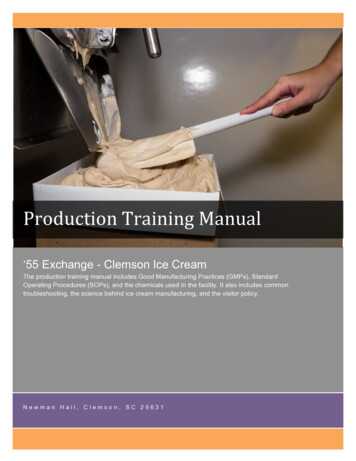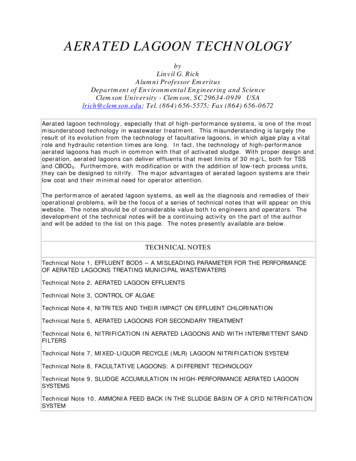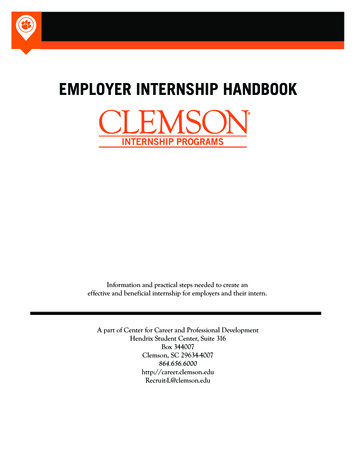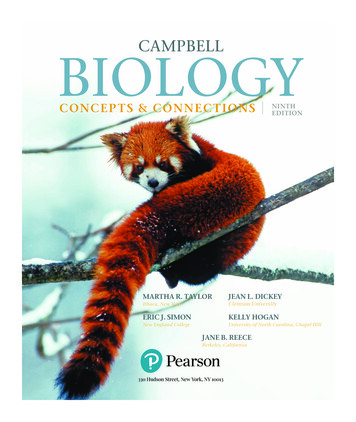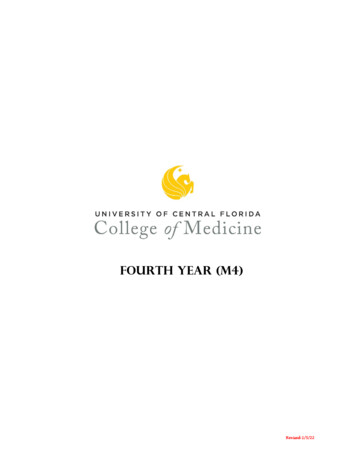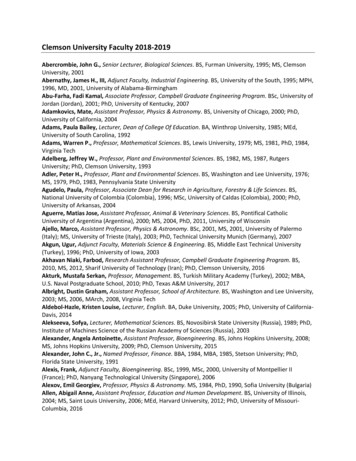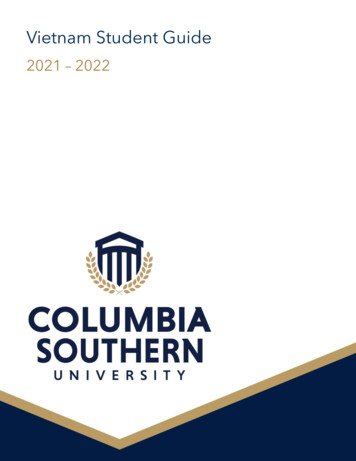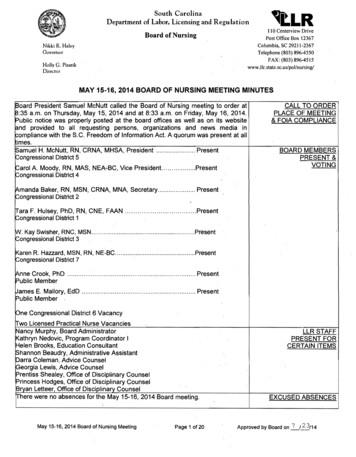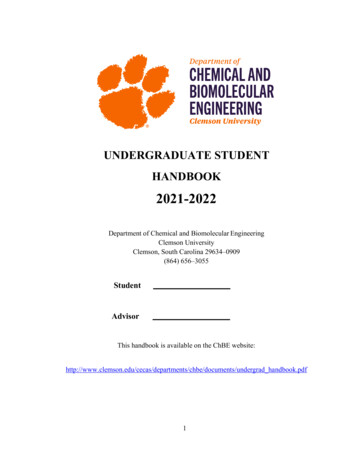
Transcription
UNDERGRADUATE STUDENTHANDBOOK2021-2022Department of Chemical and Biomolecular EngineeringClemson UniversityClemson, South Carolina 29634–0909(864) 656–3055StudentAdvisorThis handbook is available on the ChBE hbe/documents/undergrad handbook.pdf1
TABLE OF CONTENTSINTRODUCTION3DEPARTMENTAL DIRECTORY3SELECTED INDEX - UNDERGRADUATE ANNOUNCEMENTS4CHEMICAL ENGINEERING CURRICULUMChemical Engineering Program – Student Outcomes and Educational ObjectivesChemical Engineering CurriculumEmphasis Areas, including course lists and prerequisitesBiomolecular Concentration CurriculumChBE Pre-Advising WorksheetsCurriculum Analysis Matrix567-151617-1819-22CHEMICAL ENGINEERING DEPARTMENTAL POLICIESChemical Engineering Prerequisite PolicyGuide to Course Prerequisites for CHE and BMOL CurriculaCourse Substitutions and Courses Take ElsewhereChemical Engineering Departmental Academic AdvisingChemical Engineering Departmental Appeal Process2324-27282929GENERAL EDUCATION REQUIREMENTSUniversity General Education RequirementsGeneral Education Requirement Worksheet3031-32ENRICHMENT OPPORTUNITIESCooperative Education and InternshipsCo-op Schedules for Chemical Engineering CurriculumCo-op Schedules for Chemical Engineering Biomolecular Engineering ConcentrationHonors Program (Calhoun College)Senior Departmental Honors ProgramStudy Abroad OpportunityUndergraduate Research OpportunitiesGraduate Study, including Combined BS/MS Plans33-3435-3637-383939-40414142-43AMERICAN INSTITUTE OF CHEMICAL ENGINEERS STUDENT CHAPTERINFORMATION & ADVICE FOR CHEMICAL ENGINEERING STUDENTS4445-46DOS & DON’TS TO BE A SUCCESSFUL CHEMICAL ENGINEERING STUDENT47CHEMICAL ENGINEERING FACULTY482
INTRODUCTIONIt is important that you acquaint yourself with the information in this handbook, which has been prepared toinform Chemical Engineering students about their program of study, and about the Chemical & BiomolecularEngineering Department. Most of the information presented is available in the Undergraduate Announcementsor other sources, but it has been collected here for your convenience. If you have questions about anythingregarding the curriculum, the department, or the chemical engineering profession, please talk to your advisor.DEPARTMENTAL DIRECTORYDEPARTMENTAL OFFICE:127 Earle Hall(864) 656-3055www.clemson.edu/chbeDEPARTMENT CHAIR:Dr. David Bruce127 Earle Halldbruce@clemson.eduUNDERGRADUATE COORDINATOR:Dr. Amod Ogale203 Earle Hallogale@clemson.eduUNDERGRADUATE STUDENTSERVICES COORDINATOR:Ms. Joy Rodatz127 Earle Halljrodatz@clemson.eduUNDERGRADUATE STUDENTSERVICES COORDINATOR:Ms. Caitlin Clark127 Earle Hallcac4@clemson.eduGRADUATE STUDENT SERVICESCOORDINATOR/ADMIN ASSISTANTMs. Diana Stamey200 Earle Hallshort@clemson.eduOFFICE MANAGER/FISCAL ANALYST:Ms. Adair Andreasson127A Earle Hallafloyd@clemson.eduLAB EQUIPMENT/SAFETY SPECIALISTS:Mr. William Coburnwcoburn@clemson.eduMr. Chad Marcengillwcmarce@clemson.eduB14 Earle Hall3
UNDERGRADUATE ADVISORS:Each student is assigned an advisor uponentering the ChBE program. See the UndergraduateStudent Services Coordinator for your assignedadvisor.SELECTED INDEX – UNDERGRADUATE ANNOUNCEMENTSPage references below are from the latest Clemson University Announcements. In general students are subjectto the rules and regulations in place during the year in which they entered the University and to the curriculumrequirements of the year of their most recent change of major. University Announcements from prior years canbe found online at: cademic RegulationsAdmissionCenter for Career and Professional Development (Placement)Chemical Engineering Degree and CurriculaCollege of Engineering Computing and Applied Science Academic PoliciesCooperative EducationHealth, Counseling & Psychological ServicesDescription of BMOL CoursesDescription of CHE CoursesDisability ServicesFinancial AidAcademic IntegrityGeneral Education Requirements (A&H, SS, CCA, STS lists)MinorsTransfer Students and Transfer CreditsTuition and FeesTo access the academic calendar, please go to this link:http://www.registrar.clemson.edu/html/Acad Cal.htm4p. 25p. 12p. 8p. 113p. 110p. 7p. 23p. 66p. 75p. 24p. 16p. 30p. 37p. 39p. 12p. 16
CHEMICAL ENGINEERING PROGRAMWhat is chemical engineering?Chemical engineering is based on the sciences of chemistry, biology, physics and mathematics. The curriculumat Clemson emphasizes a broad range of fundamental principles in science and engineering as well ascommunication skills and humanities and social sciences. As a result, our graduates are sought avidly byindustries in many areas of technology such as energy and fuels, commodity chemicals, specialty chemicals,pharmaceuticals, biotechnology, electronic and photonic devices, food and consumer goods, advanced materials,pulp and paper, and design engineering. Chemical engineers contribute to the prevention and remediation ofenvironmental pollution, and many are involved in the application of engineering technology to the solution ofmedical and health-related problems.Intended Student Outcomes: What will I learn in the Clemson BS ChE Program?The BS program in chemical engineering at Clemson consists of a blend of classroom instruction, laboratorypractice, and project work designed to prepare graduates to accomplish our Program Educational Objectives.The program is designed to ensure that students achieve the following Student Outcomes by the time theygraduate.(1) an ability to identify, formulate, and solve complex engineering problems by applying principles ofengineering, science, and mathematics(2) an ability to apply engineering design to produce solutions that meet specified needs with consideration of(3)(4)(5)(6)(7)public health, safety, and welfare, as well as global, cultural, social, environmental, and economic factorsan ability to communicate effectively with a range of audiencesan ability to recognize ethical and professional responsibilities in engineering situations and make informedjudgments, which must consider the impact of engineering solutions in global, economic, environmental,and societal contextsan ability to function effectively on a team whose members together provide leadership, create acollaborative and inclusive environment, establish goals, plan tasks, and meet objectivesan ability to develop and conduct appropriate experimentation, analyze and interpret data, and useengineering judgment to draw conclusionsan ability to acquire and apply new knowledge as needed, using appropriate learning strategiesProgram Educational Objectives: What can I achieve as a result of my Clemson education?The undergraduate program in Chemical Engineering at Clemson University aims to produce graduates whowithin 3 to 5 years of graduation will Practice chemical engineering in a professional, ethical, and safe manner; and cultivate crossdisciplinary collaborations to solve contemporary challenges. Provide leadership in industry, government organizations, or higher education. Pursue life-long learning in chemical engineering, other engineering or science disciplines, medicine,law, or business.Because of the broad, fundamental background, chemical engineering graduates are prepared for a wide varietyof career paths. They can work in the operation and management of production facilities, conceptualengineering and design of new plants, technical marketing and sales, basic research and development, and avariety of other activities. The careers of many Clemson chemical engineers have led to top executive positionsin established companies or to entrepreneurship in their own companies.By the judicious choice of electives, a Clemson chemical engineering student can tailor his/her education to aspecific career objective. Many students use their electives and an Emphasis Area or Minor to prepare for atechnical specialization such as energy, environmental control, or polymer processing. Others gravitate towardan emphasis in business. Some students prepare for entry into a graduate program in engineering or foradvanced professional study in medicine, dentistry, or law.5
CHEMICAL ENGINEERING CURRICULUM 2021-2022Fall SemesterENGR 1020 Engr Disciplines & SkillsCH 1010 General ChemistryENGL 1030 Accelerated CompositionMATH 1060 Calculus of One Variable IGeneral Education Requirement1Freshman YearSpring Semester2CHE 1300 Intro to Chemical Eng.24CH 1020 General Chemistry3MATH 1080 Calc of One Variable II4PHYS 1220 Physics with Calculus I3Arts and Humanities/Social Science1Semester Totals:Semester Totals:16Optional Summer SemesterCHE 1300 Intro to Chemical Eng. (online)3 3Sophomore YearCHE 2110 Mass and Energy Balances4CHE 2200 Chem Engr Thermodynamics ICH 2230 Organic Chemistry3CHE 2300 Fluids/Heat TransferMATH 2060 Calc of Several Variables24CH 2240 Organic ChemistryPHYS 2210 Physics with Calculus II3CH 2290 Organic Chemistry Lab3Arts and Humanities/Social Science13MATH 2080 Intro to Ord Diff EqnsSemester Totals:17Semester Totals:Junior YearCHE 3210 Chem Eng Thermodynamics II3CHE 3070 Unit Operations Lab ICHE 3300 Mass Transfer/Separations4CHE 3190 Engineering MaterialsSTAT 4110 Statistical Methods3CH 3320 Physical ChemistryCH 3390 Physical Chemistry Lab1CH 3400 Physical Chemistry LabECE 2070 Basic Electrical Engr2Emphasis Area4ECE 2080 Electrical Engr Lab I1Arts and Humanities/Social Science1BMOL 4250 Biomolecular Engr3Semester Totals:Semester Totals:17Optional Summer SemesterCHE 3070 Unit Operations Lab I3CHE 3210 Chem Eng Thermodynamics II3CHE 3300 Mass Transfer/Separations4Senior YearCHE 4070 Unit Operations Lab II3CHE 3530 Process Dynamics/ControlCHE 4310 Chemical Process Design I3CHE 4330 Process Design IICHE 4430 Safety, Env. & Prof. Prac. I3CHE 4440 Safety, Env. & Proc. Prac. IICHE 4500 Chemical Reaction Engr3BMOL 4290 Bioprocess EngineeringEmphasis Area43Arts and Humanities/Social Science1Semester Totals:15Emphasis Area4Semester Totals:344331734314153331331633133316Total: 129 HoursNotes:1 See Policy on Social Sciences and Humanities for Engineering Curricula. Six of these credit hours must also satisfy the CrossCultural Awareness and Science and Technology in Society Requirements.2 Must3 CH4Seebe passed with a grade of C or better.2270 and CH 2280 may be substituted for CH 2290.advisor for details. Nine credit hours devoted to completion of an emphasis area or approved minor is required. Emphasisareas are these: Applied Engineering, Mathematics & Science; Biomolecular Science & Engineering; Polymeric Materials; EnergyStudies; Environmental Engineering & Science; Business Management. Emphasis area courses may not be used to satisfy otherCHE degree requirements.Note: No student may exceed two attempts, including a W, to complete successfully any CHE course.6
Emphasis Areas and the Biomolecular ConcentrationThe Chemical Engineering curriculum includes Emphasis Areas to allow students flexibility in selecting coursesand planning their future careers. Students in this curriculum must declare an area of interest and plan asequence of Emphasis Area courses in the fall semester of the sophomore year. These initial plans can bemodified later in consultation with an academic advisor. Before graduation each student in the regular ChemicalEngineering curriculum must complete 9 credit hours of approved courses in one of the following EmphasisAreas: Applied Engineering, Mathematics, and ScienceBiomolecular Science and EngineeringBusiness ManagementEnergy StudiesEnvironmental Engineering and SciencePolymeric MaterialsAlternatively, students in the Chemical Engineering curriculum may apply the 9-hours set aside for completionof an Emphasis Area toward the completion of any minor or second major offered by Clemson, except theChemistry Minor and the Cluster Minor. (You can earn a minor in Chemistry if you wish, but you will alsohave to complete an Emphasis Area.) Minor requirements are set by the department granting the minor. Detailsof each minor are available in the Undergraduate Announcements. Students who enter the program havingalready earned a baccalaureate degree from an accredited institution may apply 9 approved hours of requiredjunior or senior-level courses from the previous degree program to satisfy the Emphasis Area requirement.Students also have the option of earning a Bachelor of Science degree in Chemical Engineering with aBiomolecular Concentration. The concentration is a modified version of the BSChE curriculum that devotes 22credit hours of work to a stronger emphasis in biomolecular engineering and science.REQUIREMENTS FOR EMPHASIS AREASImportant note to students: It is your responsibility to insure that the Emphasis Area courses you select willbe offered when you want to take them and that you will meet the prerequisites and other registration criteriastipulated by the offering department. Course schedules change frequently, and many of the Emphasis Areacourses have prerequisites that are not part of the ChE curriculum.The Undergraduate Announcements lists prerequisites for every course offered by Clemson. For yourconvenience, a list of prerequisites for Emphasis Area courses are also provided below, following the courselistings.This list is not guaranteed to be complete or up to date. In some cases a department may waive a prerequisite oraccept a reasonable alternative for a well-qualified student. If you believe that you have reasonable alternativesto the listed prerequisites, then you should request a prerequisite waiver from the offering department. In othercases, even though you have the prerequisites, you may be unable to get into a course due to other registrationrestrictions such as space limitations, majors who are given priority, or the course is not offered on a regularschedule.7
The department that offers a particular course is the only reliable source that can tell you when a coursewill be offered and what requirements must be met prior to registration. Plan ahead and contact the offeringdepartment if there is any doubt about the availability of courses you select. It is highly advisable to plan aheadand coordinate the emphasis area prerequisites with your General Education requirements. For example, if youare considering the Business Management Emphasis Area, it would be advisable to take ECON 2110 for yourSocial Science requirement.Note also that not all courses listed in the Emphasis Areas have 3 credits. Therefore, depending on the set ofcourses you select, you might need to complete more than 3 courses to satisfy the 9 credit hour minimum.a) Applied Engineering, Mathematics, and Science Emphasis AreaStudents must complete 1-3 engineering course(s), 0-2 mathematics course(s), and 0-1 science course from thelists below. Students who qualify for admission to the Combined BS/MS Program can also use graduate levelcourses that apply toward the MS degree in Chemical Engineering to satisfy requirements in this EmphasisArea. See the ChE Graduate Coordinator for details.Options for Engineering Course(s):CHE 4010 (Transport Phenomena)CHE 4140 (Green Engineering)CE 2010 (Statics)IE 3600 (Industrial Applications of Probability and Statistics)IE 3610 (Industrial Quality Control)IE 4620 (Six Sigma Quality)ME 2040 (Mechanics of Materials)NOTE: Students who complete IE 3600, IE 3610, and IE 4620 will be granted aSix Sigma Certificate by the Industrial Engineering Department.Options for Mathematics Course(s):MATH 4340 (Advanced Engineering Mathematics)MATH 4500 (Introduction to Mathematical Models)Options for Science Course:CH 3130 (Quantitative Analysis, 3150 or 3170 lab must be taken concurrently)CH 4020 (Inorganic Chemistry)CH 4110 (Instrumental Analysis)CH 4130 (Chemistry of Aqueous Systems)CH 4210 (Advanced Organic Chemistry)CH 4270/4271 (Organic Spectroscopy)CH 4350 (Atomic and Molecular Structure)PHYS 2220 (Physics with Calculus III)PHYS 4200 (Atmospheric Physics)PHYS 4320 (Optics)PHYS 4410 (Electromagnetics I)PHYS 4450 (Solid State Physics)8
b) Biomolecular Science and Engineering Emphasis AreaStudents must complete 1-2 science course(s) and 1-2 engineering course(s) from the lists below.Options for Science Courses:BCHM 3050 (Biochemistry)BCHM 4310 (Physical Approach to Biochemistry)BCHM 4330 (General Biochemistry Lab)BCHM 4060 (Physiological Chemistry)BCHM 4360 (Nucleic Acid and Protein Biosynthesis)CH 3600 (Biological Chemistry)CH 4040 (Bioinorganic Chemistry)CH 4140 (Bioanalytical Chemistry)CH 4250 (Medicinal Chemistry)GEN 3120 (Molecular Genetics)GEN 4400 (Bioinformatics)MICRO 3050 (General Microbiology)MICRO 4070/4071 (Food and Dairy Microbiology)MICRO 4130/4131 (Industrial Microbiology)PHYS 4170 (Introduction to Biophysics)Options for Engineering Courses:BIOE 3020 (Biomaterials)BIOE 4010 (Bioengineering Design Theory)BIOE 4020 (Biocompatibility)BIOE 4400 (Biopharmaceutical Engineering)BIOE 4480 (Tissue Engineering)BIOE 4490 (Drug Delivery)BMOL 4260 (Biosensors and Bioelectronics)BMOL 4270 (Membranes for Biotechnology and Biomedicine)BE 4280 (Biochemical Engineering)c) Business Management Emphasis AreaStudents must take MGT 2010 (Principles of Management) plus two other courses from the list below.Options for Courses:ACCT 2010 (Financial Accounting Concepts)ELE 3010 (Introduction to Entrepreneurship)ELE 4000 (Technology Entrepreneurship)ELE 4010 (Executive Leadership and Entrepreneurship II)ECON 3060 or MGT 3060 (Managerial Economics)ECON 3100 (International Economy)ECON 3210 or ELE 3210 (Economics of Innovation)MKT 3140 (New Venture Creation I)MGT 3900 (Operations Management)MGT 4110 (Project Management)MGT 4230 (International Business Management)9
d) Energy Studies Emphasis AreaStudents must complete 9 credit hours from the following options.Options for Courses:AGRB 4570 or ECON 4570 (Natural Resource Use, Technology, and Policy)BE 4400/4401 or CE 4400/4401 (Renewable Energy Resource Engineering)CE 4370 (Sustainable Energy)CE 4430 (Water Resources Engineering)CE 4910 (Energy Related)CHE 4140 (Green Engineering)CHE 4150 (Alternative Energy)CHE 4160 (Energy Storage)ECE 4200 (Renewable Energy Penetration on the Power Grid)ECE 4570 or ME 4570 (Fundamentals of Wind Power)ECE 4610 (Fundamentals of Solar Power)ECE 4710 (Electric Vehicles and Energy Storage)EES 4090 (Introduction to Nuclear Engineering)EES 4100 (Environmental Radiation Protection)EES 4120 (Nuclear Fuel Cycle and Radioactive Waste Management) GEOL4090/4091 (Environmental and Exploration Geophysics)ME 4200 (Energy Sources and Their Utilization)ME 4220 (Design of Gas Turbines)ME 4260 (Nuclear Energy)e) Environmental Engineering and Science Emphasis AreaStudents must complete 1 science or policy course and 2 engineering courses from the lists below. Studentswho qualify for admission to the Combined BS/MS Program can also use graduate level courses that applytoward the MS or MENGR degree in Environmental Engineering and Science to satisfy requirements in thisEmphasis Area. See the EE&S Graduate Coordinator for details.Options for Science/Policy Course:CH 4130 (Chemistry of Aqueous Systems)CH 4110 (Instrumental Analysis)ENR 3120 (Environmental Risks and Society)ENSP 4000 (Studies in Environmental Science)PHYS 2450 (Physics of Global Climate Change)PHYS 4200 (Atmospheric Physics)Options for Engineering Courses:CHE 4010 or BMOL 4030 (Transport Phenomena)CHE 4140 (Green Engineering)CHE 4150 (Alternative Energy)EES 4010 (Environmental Engineering)EES 4020 (Water and Waste Treatment)EES 4100 (Environmental Radiation Protection)EES 4110 (Ionizing Radiation Detection and Measurement)EES 4300 (Air Pollution Engineering)EES 4800 (Environmental Risk Assessment)10
EES 4850 (Hazardous Waste Management)EES 4860 (Environmental Sustainability)BE 4240 (Ecological Engineering)BE 4400/4401 or CE 4400/4401 (Sustainable Energy Engineering)ETOX 4210 (Chemical Source and Fate in the Environment)ETOX 4460 (Soil and Water Quality Fundamentals)f) Polymeric Materials Emphasis AreaStudents must complete the required 9 hours by selecting courses from the following options.Options for Courses:BIOE 3020/3021 (Biomaterials)CH 4510 (Frontiers in Polymer Chemistry)CHE 4130 (Polymer Composite Engineering)CHE 4450 (Special Topics, Polymer related)MSE 4150 (Intro to Polymer Science and Engineering)or CHE 4120 (Polymer Engineering)MSE 4610/4611 (Polymer and Fiber Materials III)PKSC 4160/4161 (Application of Polymers in Packaging)g) Selected Minor in lieu of an Emphasis AreaStudents may use the 9 hours devoted to the Emphasis Area requirement to select and complete any Minor, withthe exception of the Chemistry Minor or the Cluster Minor. See the Undergraduate Announcements forrequirements in the Minor of your choice.Students who earn a second baccalaureate degree from Clemson or another accredited institution may apply 9hours of required junior or senior-level courses from the other degree program to satisfy the Emphasis Arearequirement.11
Pre-requisites for Emphasis Area CoursesWarning: Pre-requisites listed below are not guaranteed to be correct. To be certain that you can get into acourse, you must verify pre-requisites in the University Announcements and check course scheduling andenrollment restrictions with the department that offers the course.a) Applied Engineering, Mathematics, and ScienceOptions for Engineering Course(s):Course:Pre-requisites:CHE 4010CHE 3300 and MATH 2080CHE 4140CHE 2110 and MATH 1080CE 2010PHYS 1220 and MATH 2060 (or concurrent enrollment)IE 3600MATH 2060IE 3610IE 3600IE 4620STAT 4110 or CHE 3070 or IE 3600ME 2040MATH 2080, ME 2220, MSE 2100Options for Mathematics Course(s):Course:Pre-requisites:MATH 4340MATH 2080MATH 4500MATH 3600 or 3650 and MATH 3020 or STAT 2300 or STAT 3090Options for Science Course:Course:Pre-requisites:CH 3130CH 3150 or 3170 (Concurrent)CH 4020CH 1020CH 4110CH 3310 or CHE 2200 and CH 3320CH 4130CH 1020 or 1060CH 4210CH 2240CH 4270/1One year each of organic & physical chemistryCH 4350CH 3320PHYS 2220PHYS 2210PHYS 4200MATH 1080, PHYS 2080 or 2210PHYS 4320PHYS 2210PHYS 4410PHYS 2210 and MATH 2080PHYS 4450PHYS 2210Biomolecular Science and EngineeringOptions for Science Course(s):Course:Pre-requisites:BCHM 3050BIOL 1030 or BIOL 1100; Co-req CH 2230BCHM 4060BCHM 3050 or CH 2230 or CH 2010BCHM 4310BCHM 3010 or consent of instructor; Co-req: CH 3300 or CH 3310BCHM 4330Concurrent enrollment in BCHM 4230 or 4310BCHM 4360BCHM 3010 and GEN 302012
CH 3600CH 4040CH 4140CH 4250GEN 3020GEN 4400MICR 3050/1MICR 4070/1PHYS 4170CH 2230 or CH 2010BCHM 3010 or BCHM 3050 or CH 2050CH 3130 or CH 4110CH 2240BIOL 1100BCHM 3010 or BCHM 3050 or GEN 3000 or GEN 3020BIOL1100/1110 or BIOL 1030/1040/1050/1060, CH 1010, 1020BCHM 3050 or CH 2010 or CH 2230 and MICR 3050MATH 2060, PHYS 2210, or consent of instructorOptions for Engineering Course(s):Course:Pre-requisites:BIOE 3020/1MSE 2100 and BIOE 2010 and CH 2010 or MSE 2100 and CH 2230 and CH 2270BIOE 4010BIOE 3020 or BIOE 3700 or BIOE 3200 or consent of instructorBIOE 4020/1BIOE 3020 and BIOL 4610 or consent of instructorBIOE 4400BCHM 3010 or BCHM 3050BIOE 4480BIOE 3020 and BIOE 3100 or BIOL 3150 and BIOL 4610BIOE 4490BIOE 3020BMOL 4030CHE 3300, MATH 2080BMOL 4260CHE 3300, and BCHM 3010 or BCHM 3050, or consent of instructorBMOL 4270CHE 3300 or equivalent or consent of instructorCHE/BE 4280Co-req CHE 3300Business ManagementCourse:Pre-requisites:MGT 2010noneACCT 2010noneELE 3010noneELE 4000Junior standing in engineeringELE 4010ELE 3010ECON 3060ECON 2110ECON 3100ECON 2110 and 2120ECON 3210ECON 3060 or 3140MKT 3140Junior standingMGT 3900STAT 3090 or equivalent and MGT 2180 or equivalentMGT 4110STAT 3090 or equivalentMGT 4230Junior StandingEnergy StudiesCourse:AGRB/ECON 4570BE/CE 4400/1CE 4370CE 4430CE 4910Pre-requisites:MATH 1020 or MATH 1060 and AGRB 3570 or ECON 3140Junior standing in engineeringCE 3310CE 3410 (Fluid Mechanics)Consent of instructor; priority to CE majors13
CHE 4140CHE 4150CHE 4160ECE 4200ECE/ME 4570ECE 4610ECE 4710EES 4090EES 4100EES 4120GEOL 4090/4091ME 4200ME 4220ME 4260CHE 2110, MATH 1080CHE 2200, CHE 2300CHE 2200, CHE 2300ECE 2070 or ECE 3070 or ECE 3200ECE 2070 or ECE 3070 or ECE 3200ECE 3200ECE 3200MATH 2080PHYS 2210 and EES 4090EES 4090Junior standingME 3030, 3040 or consent of instructor: priority to MEmajors ME 3080 (Fluid Mechanics)CHE 3210Environmental Engineering and ScienceOptions for Science/Policy Course:Course:Pre-requisites:CH 4130CH 1020 or CH 1060CH 4110CH 3310 or CHE 2200 and CH 3320ENR 3120Junior standingENSP 4000ENSP 2000 or EES 2020 or consent of instructorPHYS 2450NonePHYS 4200MATH 1080 and PHYS 2080 or PHYS 2210Options for Engineering Course(s):Course:Pre-requisites:BE 4240CE 3410 or CHE 2300 or ME 3080BE 4400/1Junior standing in engineeringCHE 4010CHE 3300 and MATH 2080 (same for BMOLE 4030)CHE 4140CHE 2110 and MATH 1080CHE 4150CHE 2200 and CHE 2300EES 4010CHE 2300EES 4020EES 2020 or EES 4010 or BE 4100EES 4100PHYS 2210 and EES 4090EES 4110/1EES 4100 or consent of instructorEES 4300EES 2020 or 4010EES 4800EES 2020 or 4010 and MATH 2080EES 4850EES 2020 or 4010 and CH 20210 or CH 2230EES 4860Junior standing in engineeringETOX4210CH 2230, CH 2270, and CH 3130ETOX4460CH 224014
Polymeric MaterialsCourse:BIOE 3020/1CH 4510CHE 4120CHE 4130CHE 4450MSE 4150MSE 4610/1PKSC 4160/1Pre-requisite:BIOE 2010 and MSE 2100 and CH 2230 and CH 2270CH 2230 and CH 2240 and MSE 4150CH 2240 and CH 3320CH 2240 and CHE 4120 or MSE 4150Consent of instructorCH 2240 or CH 2010MSE 4150CH 2230, consent of instructor15
CHEMICAL ENGINEERING CURRICULUM 2021-22 with BIOMOLECULAR ENG. CONCENTRATIONFall SemesterENGR 1020 Engr Disciplines & SkillsCH 1010 General ChemistryENGL 1030 Accelerated CompositionMATH 1060 Calculus of One Variable IGeneral Education Requirement1Freshman YearSpring Semester2CHE 1300 Intro to Chemical Eng.24CH 1020 General Chemistry3MATH 1080 Calc of One Variable II4PHYS 1220 Physics with Calculus I3Arts and Humanities/Social Science116Semester Totals:Semester Totals:Optional Summer SemesterCHE 1300 Intro to Chemical Eng. (online)4 3Sophomore YearCHE 2110 Mass and Energy Balances4CHE 2200 Chem Engr Thermodynamics ICH 2230 Organic Chemistry3CHE 2300 Fluids/Heat TransferMATH 2060 Calc of Several Variables4CH 2240 Organic ChemistryBIOL 1100 Prncpls of Biology (w/Lab)34CH 2290 Organic Chemistry Lab41Arts and Humanities/Social Science3MATH 2080 Intro to Ord Diff EqnsSemester Totals:18Semester Totals:Junior YearCHE 3210 Chem Eng Thermodynamics II3CHE 3070 Unit Operations Lab ICHE 3300 Mass Transfer/Separations4CHE 3190 Engineering MaterialsPHYS 2210 Physics with Calculus II3MICR 4130 Industrial MicrobiologyBiochemistry Requirement53BIOE 3020 Biomaterials3Arts and Humanities/Social Science1STAT 4110 Statistical Methods3Semester Totals:BMOL 4250 Biomolecular Engr19Semester Totals:Optional Summer SemesterCHE 3070 Unit Operations Lab I3CHE 3210 Chem Eng Thermodynamics II3CHE 3300 Mass Transfer/Separations4Senior YearCHE 4070 Unit Operations Lab II3CHE 3530 Process Dynamics/ControlCHE 4310 Chemical Process Design I3CHE 4330 Process Design IICHE 4430 Safety, Env. & Prof. Prac. I3CHE 4440 Safety, Env. & Proc. Prac. IICHE 4500 Chemical Reaction Engr3BMOL 4290 Bioprocess EngineeringBCHM 4310 Physical Biochemistry3Arts and Humanities/Social Science1Engineering Requirement6Semester Totals:15Semester Totals:34433173431415333331633133316Total: 130 HoursNotes:1 SeePolicy on Social Sciences and Humanities for Engineering Curricula. Six of these credit hours must also satisfy the CrossCultural Awareness and Science and Technology in Society Requirements.2 Must3be passed with a grade of C or better.BIOL 1030, BIOL 1040, BIOL 1050, and BIOL 1060 may be substituted for BIOL 1100.4 CH2270 and CH 2280 may be substituted for CH 2290.5Select6Selectfrom BCHM 3010, BCHM 3050, BCHM 4230, or CH 3600.from CHE 4010 or BMOL 4030, BMOL 4270, BE 4280 or 4350, BIO 4400, 4490 or 4760Note: No student may exceed two attempts, including a W, to complete successfully any CHE course.16
ChBE Pre-Registration Advising WorksheetName:CUID#:Plan Ahead: Indicate courses you plan to take NEXTsemester. In the right-hand box, indicate courses you plan totake over the summer. Leave the summer box blank if you donot plan to take any summer courses.FallSpringYearCourse & Number(e.g., CHE 2110)Email:@clemson.eduCatalog Year:Co-op Student:SummerCredit HoursYearCourse & Number(e.g., CHE 3070)Comments to Advisor:Credit HoursTotal Credits:Advisor/Faculty Comments :Total Credits:Required Courses Checklist: For listed courses, please indicate “C” if completed, “P” if in progress or “R” if re-taking. Enter yourchosen Emphasis Area/Minor, and list the specific emphasis area/minor courses that are in progress or you have already 530CHE4330CHE4440Emphasis Area/Minor Courses TakenEmphasisArea or MinorGeneral Education Checklist: Please indicate the specific course and number (e.g., ENGL 2120) attributed to each generaleducation requirement that you have already taken. Do NOT simply list “C”, “P”, or “R” for these courses.Hum. Lit21234Hum. Non-Lit2Social Sci. #12Social Sci. #22ChE H/SS #13ChE H/SS #21,3CCA4STS4Depending on your curriculum year, this may have an alternate requirement.Select from University approved Humanities and Social Science courses: see General Education of the Undergraduate Catalog at http://catalog.clemson.edu/Select courses from www.clemson.edu/cecas/current-students/humanities policy.html.STS and CCA requirements may be satisfied by other Gen Ed courses as long as the student completes a total of 31 hours ofGen Ed (see Undergraduate Announcements for courses that may satisfy both requirements).Notes: Refer to the ChBE Undergraduate Handbook for a comprehensive description of Departmental Policies and curriculuminformation. www.clemson.edu/
Chemical engineering is based on the sciences of chemistry, biology, physics and mathematics. The curriculum at Clemson emphasizes a broad range of fundamental principles in science and engineering as well as communication skills and humanities and social sciences. As a result, our graduates are sought avidly by
